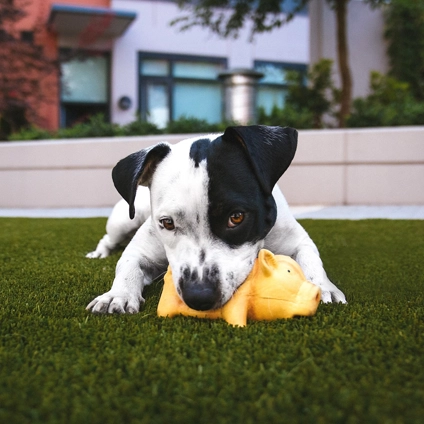


THE HOUND HUB
Biting and mouthing in your dog
Help & Advice
27 March 2024
A dog with biting and mouthing habits presents significant challenges and concerns for both owners and those around them. While some degree of mouthing is natural behaviour for dogs, excessive or inappropriate biting can lead to various problems that affect the safety, well-being, and relationships of everyone involved.
Firstly, biting and mouthing behaviour in dogs can cause physical harm or injury to humans or other animals. Even if the dog does not intend to cause harm, their sharp teeth and strong jaws can inflict painful bites or scratches, leading to bruises, cuts, or puncture wounds. This poses a risk of infection, scarring, or permanent damage, particularly for vulnerable individuals such as children, elderly people, or those with compromised immune systems. Additionally, aggressive biting behaviour can escalate quickly and unpredictably, leading to serious injuries or medical emergencies that require immediate attention.
Moreover, biting and mouthing behaviour can undermine the trust and bond between the dog and its owners. Dogs that exhibit biting or mouthing habits may be perceived as unpredictable or dangerous, leading to fear, anxiety, or discomfort within the household. Owners may feel hesitant or fearful of interacting with their dog, compromising the quality of their relationship and diminishing the dog's overall sense of security and belonging. This can lead to strained relationships, decreased mutual trust, and a breakdown in communication between the dog and its owners.
Furthermore, biting and mouthing behaviour can interfere with everyday interactions and activities involving the dog. Dogs that bite or mouth excessively may engage in rough play or become overly excited during interactions, making it challenging for owners to handle or control their behaviour. This can lead to disruptions, accidents, or conflicts within the household, undermining the harmony and well-being of everyone involved. Additionally, biting or mouthing behaviour can limit the dog's opportunities for socialization and positive experiences with others, as owners may feel reluctant to expose their dog to situations where biting or mouthing may occur.
Additionally, biting and mouthing behaviour can result in legal liabilities, financial repercussions, and emotional distress for owners. Dogs that bite or injure others may be subject to legal action, fines, or penalties, leading to legal expenses, damages, or even the loss of the dog's life in extreme cases. Moreover, owners may experience guilt, shame, or anxiety over their dog's behaviour, particularly if it results in harm to others or strains relationships with neighbours, friends, or family members.
In conclusion, biting and mouthing behaviour in dogs is not acceptable due to its potential for causing physical harm or injury, undermining trust and relationships, interfering with everyday interactions, limiting socialization opportunities, and leading to legal liabilities and emotional distress for owners. Addressing biting and mouthing behaviour requires a multifaceted approach that encompasses training, behaviour modification, management, and ongoing support from professional trainers or behaviourists. By addressing the root causes of biting and mouthing behaviour and implementing effective strategies to modify and manage the behaviour, owners can promote a safer, more harmonious, and fulfilling relationship with their dog while ensuring the safety and well-being of all involved.

For more information on how we can help, please contact us using the form below:
For more information on how we can help, please contact us using the form below:
